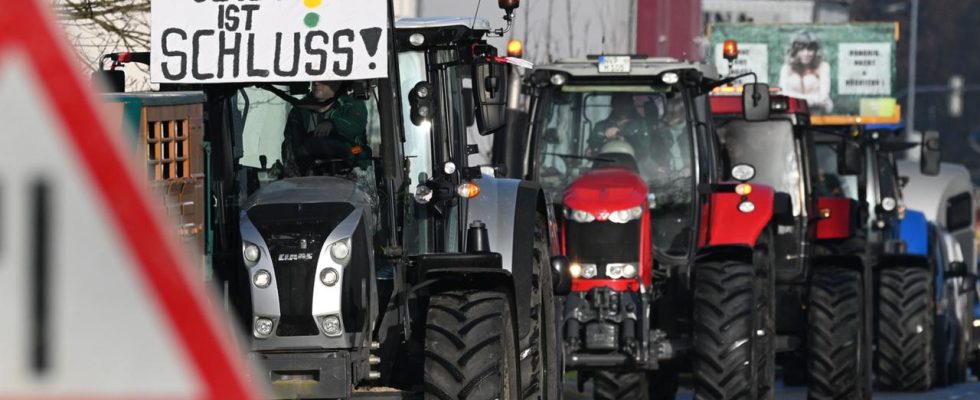interview
According to agricultural economist Henning, the farmers’ protests cannot only be explained by the abolition of subsidies. In an interview, he explains what role sustainable land use plays and how a win-win situation is possible.
tagesschau.de: The reason for the protests is the abolition of the subsidy for agricultural diesel and relief from vehicle taxes. How much money do farmers lose as a result?
Christian Henning: When you convert that, it’s probably best to do it per hectare. That’s about 25 euros per hectare. That might not say much right now. If you put that into perspective, for example in arable farming, then we have costs of around 1,000 euros per hectare. If you put that into perspective, that’s 2.5 percent.
I think it can be stated that these highly emotional protests cannot be explained purely economically by this elimination. I think it’s more of a fundamental dissatisfaction with the wrong signals that have been coming out of agricultural policy for years.
tagesschau.de: Are companies’ existence threatened by the loss of subsidies?
Henning: On average, definitely not. Of course, you can always find companies that are already in difficult situations. Around ten percent of companies make a loss, even before this subsidy is removed. If the subsidies then disappear, then it will certainly be a precarious situation for them. But of course such measures cannot be identified in individual cases of hardship. On average, definitely no: No significant intervention in the direction of threatening existence.
tagesschau.de: Who is this actually about? Are they primarily family businesses? We often have that image in our heads.
Henning: Yes, you can say that quite clearly. In Europe, but especially in Germany, we have agriculture that is clearly organized as a family business. There are also other types of businesses in the new federal states that are significantly larger and may then no longer be run in the form of a family business. But to put it this way: 90 percent of the companies are family businesses, if not more.
To person
Christian Henning is an agricultural economist. Since 2001 he has been a professor of agricultural policy at the University of Kiel.
His research interests include rural development policy, policy network analysis of European agricultural policy and political-economic modeling of agricultural policy decision-making processes in industrialized and developing countries.
“Paradigm shift towards sustainable land use”
tagesschau.de: The reduction in subsidies seems to have been the last straw. Where do you see problems that were there before and have not been solved?
Henning: I think the central point is that we have had a paradigm shift towards sustainable land use over the last ten, maybe 15 years. And that farmers have clearly signaled, especially in the last five years – the Future Commission – that they are ready to go along with this transformation.
But reasonable agricultural policy framework conditions must also be created here so that farmers, as entrepreneurs, can actually deliver these ecosystem services of climate protection and biodiversity.
These framework conditions have not yet been created at all, but individual small, symbolic measures, essentially regulatory measures, regulatory measures, have been adopted, especially by the Federal Republic, which in the end are not at all effective in the overall picture.
Take advantage of the moment
tagesschau.de: What was that about? How could this be done better?
Henning: What caused this is always difficult in detail. On the one hand, such fundamental changes are of course always processes that take a certain amount of time and that may well be the right thing to do. And so perhaps you always need clear signals so that dissatisfaction is clearly signaled, that politics is clearly addressed in order to then perform and react accordingly. You definitely have to give these things time, because you can’t do it overnight.
And on the other hand, it is certainly also because there is a certain history and that of course always causes a certain inertia in politics. And when you finally see that we carry out agricultural policy largely at the European level, i.e. jointly, or set the framework conditions, then that is an even more difficult process because every nation state always has its own specific problems and perspectives. And that’s how processes like this take time.
In my opinion, from a scientific point of view, this is more of a natural process. It is only important once you formulate it that it is actually implemented. And I think now is such a good time, which will hopefully now be used.
A win-win situation is possible
tagesschau.de: How can we get out of this overheated situation with a solution that satisfies all parties?
Henning: I think that Minister Özdemir in particular has already made a correct sentence or a correct submission. In any case, we should solve this together. This is a social task. And what’s so nice – perhaps this is a positive signal from science: This transformation that we want is actually a win-win situation for consumers and for farmers. Now we just have to design it correctly in terms of agricultural policy.
It is important that we now begin to create exactly this framework condition on the part of politicians, so that we ultimately create opportunities for these ecosystem services to become products for farmers, which they can then supply in the future at guaranteed or likely guaranteed prices invest in appropriate technologies so that we become more and more sustainable in the long term.
The interview was conducted by Mikhail Paweletz for tagesschau24. It was shortened and edited for the written version.

